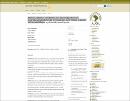| dc.contributor.author | Vancampfort, Davy | |
| dc.contributor.author | Watkins, Andrew | |
| dc.contributor.author | Ward, Philip B | |
| dc.contributor.author | Probst, Michel | |
| dc.contributor.author | De Hert, Marc | |
| dc.contributor.author | Van Damme, Tine | |
| dc.contributor.author | Mugisha, James | |
| dc.date.accessioned | 2022-02-18T12:26:22Z | |
| dc.date.available | 2022-02-18T12:26:22Z | |
| dc.date.issued | 2019-11-06 | |
| dc.identifier.citation | Vancampfort, Davy...et al (2019). Barriers, attitudes, confidence, and knowledge of nurses regarding metabolic health screening and intervention in people with mental illness: a pilot study from Uganda. AJOL: African Health Sciences. 10.4314/ahs.v19i3.30. | en_US |
| dc.identifier.issn | 1680-6905 | |
| dc.identifier.uri | 10.4314/ahs.v19i3.30 | |
| dc.identifier.uri | https://kyuspace.kyu.ac.ug/xmlui/handle/20.500.12504/629 | |
| dc.description | 2546-2554 p. | en_US |
| dc.description.abstract | People with mental illness are at an increased risk for developing cardio-metabolic disorders. Routine screening following pharmacotherapy is however unacceptably low in sub-Saharan African countries with less than 1% adequately screened. It is unknown whether this is due to a lack of adequate competences.
Objectives: The aim of this pilot study was to assess the barriers, attitudes, confidence, and knowledge of nurses regarding metabolic health, prevention and treatment in Uganda.
Methods: Twenty-eight nurses (39% female, 30.9±6.9 years) completed the Metabolic – Barriers, Confidence, Attitudes and Knowledge Questionnaire and the physical activity prescription rate item of the Exercise in Mental Illness Questionnaire.
Results: More than 75% had a positive attitude towards metabolic screening and intervention and more than 50% were confident in providing smoking cessation advice, and physical activity and nutritional counseling. However, 57% stated that their heavy workload prevented them from doing health screening and promotion activities. There was a negative correlation (ρ=-0.54, P=0.003) between the frequency of physical activity prescription and the perception of the inability of patients to change.
Conclusion: The present findings suggest that nurses are generally supportive of metabolic health screening and intervention but their high workload prevents them from implementing metabolic health interventions. | en_US |
| dc.language.iso | en | en_US |
| dc.publisher | AJOL: African Health Sciences. | en_US |
| dc.relation.ispartofseries | Vol.19;No.3 | |
| dc.subject | Exercise | en_US |
| dc.subject | Diet | en_US |
| dc.subject | Metabolic syndrome | en_US |
| dc.subject | Screening | en_US |
| dc.subject | Smoking | en_US |
| dc.title | Barriers, attitudes, confidence, and knowledge of nurses regarding metabolic health screening and intervention in people with mental illness: a pilot study from Uganda | en_US |
| dc.type | Article | en_US |

